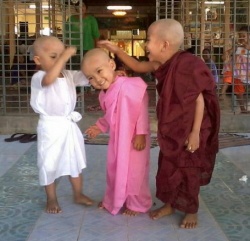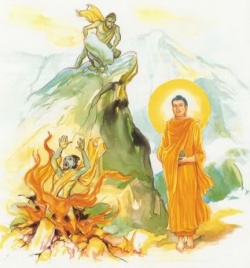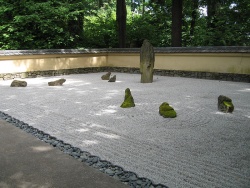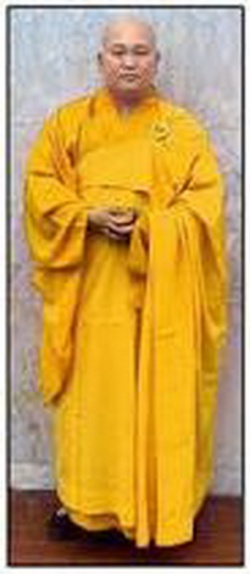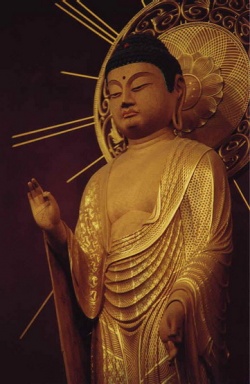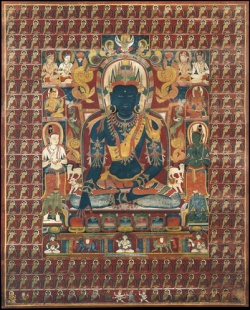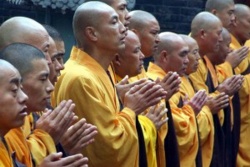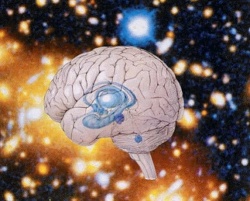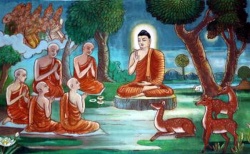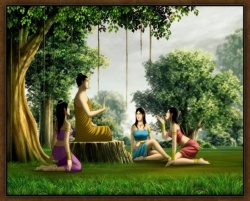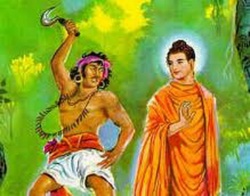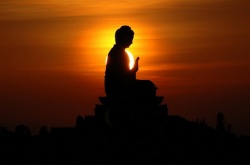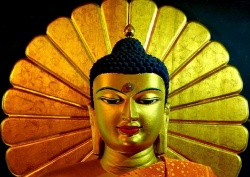Studies in Buddhadharma - On Merit
- "Merit, there are four kinds of action proclaimed by me after realizing them for myself with direct knowledge. What are the four ? There is dark action with dark result ; there is bright action with bright result ; there is dark-and-bright action with dark-and-bright result ; and there is action that is neither dark nor bright with neither-dark-nor-bright result, action that leads to the destruction of action."
- - Madhyamâgama (Majjhima-nikâya), 57.7.
- "There are, O Monks, three ways of making merit. What three ? There are ways of making merit by giving, by moral discipline, and by the development of meditation."
- - Ekottarâgama (Anguttara-nikâya), IV 241.
- "The merit gained in a single day
- By those who possess higher perception
- Cannot be gained even in a hundred lifetimes
- By one without such higher perception."
"Punya" or "merit" is a particular type of "karma" leading to the destruction of "karma" and the escape from "samsâra". "Karma" is conditioned action arising from a motive and seeking a result, i.e. always requiring further action. Confusion between good "karma" and merit is common. The former leads to a better rebirth (a higher one with better circumstances), whereas the intent of the latter is to cause liberation from "samsâra" by virtue of the power of the object of merit, the Three Jewels : Buddha, Dharma & Sangha. Hence, good "karma" & merit differ in terms of motivation & goal. As one of the two causes of enlightenment (the other being wisdom), it takes us beyond cyclic existence. Moreover, excellent merit is motivated by the mind of enlightenment for the sake of all sentient beings (cf. Bodhicitta).
Another form of the object of merit is the so-called "Field of Merit", the assembly of enlightened beings visualized during meditation in front of us. Ordinary (samsaric) good seeds allow us to harvest outer ordinary (samsaric) crops. But if we sow faith & the spiritual path in the Field of Merit, we harvest, besides good fortune in this and the next life, the extraordinary inner crops of Dharma realizations such as love, compassion, joy, equanimity, "Bodhicitta", physical & mental suppleness, wisdom, liberation, the irreversible escape from cyclic existence, and final enlightenment. Ordinary good "karma" can never realize this ! It does lead to the climax of the world of the gods, yet gets exhausted and so cannot take away suffering for good.
While liberation allows the Arhat to enter a personal, "lesser" type of "nirvâna", final enlightenment involves a total, complete escape from all emotional defilements and mental obscurations of "samsâra".
The General Characteristics of Karma
"Karma" or "action" is understood as a mental, verbal (energetical) or physical deed, and "vipâka" its fruit, result or reaction, accompanying every action like a shadow following its object. The seed is "karma", the fruit arising from it is "vipâka". In general, "karma" refers to actions, their effects and the potentialities left in the mind from the moment of the completion of the action to the moment they ripen and their results are experienced.
In a wider sense, every contaminated event (a phenomenon tainted by reification) is determined by "karma", the natural power of action and its consequences. Karmaless action has done away with reification. The complete network of concordant conditions giving rise to physical, psychological & social determinations is the result of past momenta. Much of what "karma" was about in the past, is today the object of science (the DNA-code as an example of "karma" ?). In a narrow sense, "karma" points to the spiritual consequences of actions and cannot be divorced from an implicit hylic pluralism, explaining how the invisible mechanisms of "karma" operates.
Any kind of physical, verbal & mental intentional action is "karma" and so generally, all good & bad actions constitute "karma". Involuntary, unintentional or unconscious actions, although deeds, do not constitute "karma", for conscious volition is absent. This differs from those non-Buddhists (like the Jains) who think unintentional actions also constitute "karma".
In the workings of "karma", mind is crucial. All physical actions, verbal & mental deeds are coloured by consciousness. Hence, when mind is guarded, bodily action is guarded and speech is also guarded.
The simple mechanism of action is given by the first two kinds of actions mentioned by the Buddha : good begets good, evil begets evil, like attracts like. A same message is heard in Ancient Egypt, in the Judeo-Christian West and in the Muslim world. This universal message is not typically Buddhist. By contrast, the notion of action destroying action points to the Truth of Cessation and the possibility of "nirvâna". This destruction cannot be complete without the end of ignorance ("avidyâ"), the fundamental root-cause of our wandering about as blind, unsatisfied, closed-up actors.
The law of karma has five major characteristics :
- definite results : when a farmer sows a barley seed, it is definite barley will grow and not corn. Likewise, when we perform positive (negative) actions, it is certain happy (unhappy) results will be the outcome. The latter depend on two causes : (a) the primary cause : the nature of the seed & (b) the secundary causes : concordant conditions allowing the primary cause to unfold (for example, if the ground is frozen, the seed cannot sprout). Soteriologically, these secundary causes are important to consider, for if they can be eliminated, the primary cause cannot manifest ;
- increasing results : because the power of actions increases day by day, very small cause bears large results (cf. chaos-theory). Small unvirtue unopposed produces great suffering and over time, small virtue bears large happiness ;
- without action, no fruit : if the cause has not been created, the fruit cannot ripe. This is good news, for although we are the cause of our own suffering, we can also be the agent of our own happiness ;
- no action is wasted : although it may take a long time before actions ripen, they are never without result. As long as the effect does not manifest (is still potential), it can be opposed and neutralized. Here the inevitability of the consequence shows how all unvirtue will produce suffering for the agent ;
- all action can be opposed : all negative potentialities can be eliminated by opposing them with the Four Opponent Powers : (a) the power of reliance ; (b) the power of regret ; (c) the power of promise & (d) the power of anti-dote. Hence, if we oppose the negative potentialities by purifying them, no negative effects can manifest. This is very important good news ; there is no negative accumulation whatsoever which cannot be eliminated. Hence, there cannot be a permanent hell.
Actions in Buddhism
The concomitant advantages or good consequences of good "karma" are prosperity, health and longevity ("ânisamsa"), whereas bad "karma" yields poverty, ugliness, disease and a short or shortened life-span. However, in Buddhism happiness and suffering are not assigned to an immortal soul by a supernatural Deity, but is a natural law which cannot be suspended, not even by a Buddha. There is no fatality or destiny, for one has the power to divert the course of "karma" by increasing virtue, opposing negative potentialities and eliminating the root of all "karma", ignorance. Neither is there predestination, for -to stop suffering- no mysterious Deity needs to be invoked to whom we must helplessly submit ourselves and nobody "saves" us by taking upon himself the "sins of the world" ... To know how one has lived one only needs to observe how one is presently living. To know how one will live, one only needs to observe how one is living right now.
Because, according to the Sûtras, there is no unchanging, independent entity, doer or actor apart from the action, volition ("cetanâ") is itself the doer and feeling ("vadanâ") is itself the reaper of the action. Apart from these two mental states, there is no sower and no reaper (just like thought itself is the thinker). But in the Tantra teachings, Buddha distinguishes between the gross, subtle & very subtle levels of mind & body. Physical death eliminates the gross mind/body-complex, allowing the subtle complex to dissolve into the very subtle, "resident, indestructible drop" situated in the heart-chakra. This deepest consciousness is the foundation of our consciousness-continuum or mindstream, and has been there since beginningless time. It will continue to be there all the way up to Buddhahood and thereafter. In its defiled condition, it acts as a "store-house" or "receptacle" consciousness ("âlaya-vijñâna"), in which the collectivity of seeds ("bîja") sown by previous moments of consciousness abide, perfuming future moments. This explains how "karma" operates. This impure "clinging consciousness" needs to be purified by the wisdom realizing emptiness, purifying the coarser levels of consciousness.
In the traditional six schools of Indian philosophy, three type of "karma" are distinguished :
- future karma ("âgâmi-karma") : these effects arise as a result of one's present actions and desire (our current works of virtue). This karma depends on present actions and so allows one to influence the future. Producing good causes will have good effects in the future. This is karma totally under our present control ;
- karma begun before ("prârabhda-karma") : these are the effects of deeds begun in a former life. The resulting events, or ripened "karma" cannot be prevented, just as one cannot call back an arrow leaving the bow. So these effects must be accepted until the effect is exhausted. While it is possible to prevent these effects to rise (by purifying them before they arise or by making sure their secundary causes remain absent), one cannot eliminate them when present. If present, Superior Beings may, by way of their miracle-powers, attenuate or partly deflect them, but never destroy them ;
- karma not yet ripened ("sanchita-karma") : the accumulated "samskâras" created by an individual in previous lives awaiting effect in a future life. These impressions or tendences are possiblities present in consciousness arisen through actions. Under the power of secundary causes these potentialities actualize. They can be purified by the application of the opponent powers. Then they never rise. In this way, by applying a lot of effort, the consequences of the most vile evil can, in principle, be reversed ... Insofar as sentient beings modify their ways, there is always hope !
The Ten Non-Virtuous Actions
These non-virtuous actions are paths leading to the lower realms of "samsâra" (hell-beings, hungy ghosts, animals), i.e. to more confusion and suffering. In principle, there are countless non-virtuous actions, but they are classified insofar as the cause is physical, verbal or mental :
1) Negative physical actions :
- Lying.
- Slandering (divisive speech).
- Abusing (hurtful speech).
- Gossiping (idle chatter).
- Malice.
- Avarice (covetousness).
- Wrong views.
The full negative result or fruit is experienced if and only if the non-virtuous action is complete. The latter is the case if and only if four factors are simultaneously present :
- The Four Factors of Completion
- the object of the action : the object of the action depends on what kind of non-virtue is at hand :
- killing : any other being, from an insect to a Buddha ;
- sexual misconduct : is analyzed in terms of the "Four Wrongs" :
(a) wrong object : any unsuitable object of attention : for a celebate monk (nun) : any other person, for a layman : anyone else's partner, our own parents, a child, a monk (nun), a pregnant woman, animals, any non-consenting person ;
(b) wrong organ : anal or oral sex ;
(c) wrong place : places offending others (public space or sacred space) ;
(d) wrong time : during pregnancy, illness or when one has taken vows ; - stealing : anything someone else regards as their own ;
- lying : about what is seen, heard, experienced, known, not seen, not heard, not experienced, not known and certain non-verbal actions like physical gestures, writing or remaining silent ;
- slandering : two or more people having a relationship ;
- abusing : any person who can be hurt by what is said ;
- gossip : any meaningless object ;
- malice : hurting any other person by thought, word or deed ;
- avarice : wanting anything belonging to someone else ;
- wrong views : denial of what is needed for liberation & enlightenment ;
- the intention of the action : for there to be a full intention to commit any negative deed, three factors are needed :
(a) correct discrimination : the correct identification of the object ;
(b) determination : the will to carry out what has been correctly identified ;
(c) delusion : a mind motivated by one of the Three Poisons : ignorance, craving & hatred. A medical doctor may kill the sick mother to save the healthy baby. A Bodhisattva may kill a potential murdered out of compassion to save lives and/or to prevent the culpit from accumulating vast negative karma ; - the preparation of the action : the preparation of the means to engage in a negative action ;
- the completion of the action : the negative action is complete when the object of the action has been realized, i.e. not abrogated.
The severity of non-virtuous actions or the degree of suffering caused depends on the power of the action. The latter is determined by six factors :
- The Six Factors of Severity
- the nature of the action : physical & verbal non-virtuous actions can be listed in order of the degree of the harm inflicted : killing, stealing, sexual misconduct, lying, slandering, abusing & gossiping. Among the mental non-virtuous actions, the order is : wrong views, malice & avarice ;
- the intention : the stronger the delusion, the more negative the intention. Insofar an bad action is immediately followed by a thought negating its inherent existence, the negative intention is lessened, if not eliminated ;
- the method : the degree of harm inflicted by the chosen method ;
- the object : the more important the object, the more powerful it becomes ;
- the frequency : the more it is repeated, the more powerful it becomes ;
- the absence of an opponent : absence of virtue or regret is more powerful.
Non-virtuous actions have three effects :
- The Three Effects
- the ripened effect : rebirth into a lower realm or rebirth as a human burdened with vast suffering ;
- the effects similar to the cause : these are tendencies or experiences similar to the cause. Tendencies make us repeat similar actions in the future and experiences bring us in direct contact with similar negative actions (done by others), but of which we are the object ;
- the environmental effect : rebirth in hostile environments resembling the non-virtuous action.
Moral Discipline
Moral discipline is to deliberately refrain from the Ten Non-Virtuous Actions on the basis of a clear recognition of their dangers. Realizing the effects of bad actions and the firm motivation to practice their abandonment constitutes the practice of good actions. Not performing bad actions is thus not enough. To harvest the beneficial effect, we have to be conscious of the difficulties caused by bad actions. The same four factors of completion and three kinds of effects also pertain for good actions.
The power of good & bad actions depends on four factors :
- The Four Factors of Power
- the person who is the object of the action : to direct actions towards those who are kind to us increases their power ;
- the vows taken : performed as the result of vows, actions become more powerful ;
- the object instrumental in the action : when the object is useful or helpful to the other person, the action is more powerful ;
- the motivation : actions done with a strong motivation are more powerful.
Moral discipline is to deliberately refrain from the Ten Non-Virtuous Actions on the basis of a clear recognition of their dangers.
Most virtuous actions, so-called good "karma", do not liberate or enlighten sentient beings. They cause to experience happy results and good circumstances in future lives, but this "karma" does not set them free. Why ? Ordinary beings taint their virtuous actions by self-cherishing, thinking the "I" performing the good action exists inherently, from its own side, as an independent substance. This ignorance (or confusion about the real nature of the subject) is mixed with our mind when performing the good deed. We cherish the good deed by thinking : I am doing good and will be rewarded ! Although our intentions are not deluded, the delusion of an autonomous subject is present. As a result, our virtuous actions producing good "karma" are still the cause of rebirth in "samsâra". Hence, the virtuous actions of ordinary humans are "throwing actions", hurling them in the fortunate worlds of desire of humans or gods. Likewise, non-virtuous actions throw them in the unfortunate states within cyclic existence : the hells, the painful state of the hungry ghosts or the ignorant existence of animals.
At this point, the crucial difference between good "karma" and merit ("punya") becomes poignant. By itself, positive "karma" does not free sentient beings from cyclic existence. It just makes them "move up" the ladder of "samsâra". Their type of suffering alters, but suffering remains. It does not end actions, but causes good effects within "samsâra". But, as the Wheel of Life teaches, the effect of all actions exhausts itself, making all actions impermanent & transient. So although they have created for themselves better conditions (less painful suffering), the causes of this improvement eventually end and so chances are they find themselves again in the same or even in more severe types of closed spaces. All sentient beings experience the exhaustion of their good and bad "karma". Only merit builds a supramundane "capital". Only "nirvâna" is true peace, lasting, permanent, unceasing ... This reflects the optimism of the Buddhadharma, and the fundamental way it differs from the traditional Brahmanistic interpretation of "karma".
In sensu stricto, merit can be defined as the result of virtuous actions not causing samsaric rebirth. These are not throwing actions, for they cause liberation from cyclic existence by virtue of the special power of the object of merit : the Three Jewels : the Buddha, the Dharma & the Sangha. Hence, virtuous actions associated with merit have two effects : (a) they result in positive effects within "samsâra" without throwing us in cyclic existence and (b) end actions, i.e. liberate us from suffering by the power of cessation inherent in the Dharma.
Placing moral boundaries, or taking vows, is part of the process of transformation and must be done with great skill. Three levels exist :
- the "Prâtimoksa" vows : to protect one's own well-being ;
- the Bodhisattva vows : to protect the well-being of others ;
- the Tantric vows : to protect one's relationship with one's Higher Self or tantric Deity.
Meritorious Action
Meritorious actions are all activities of mind, speech (energy) & body having as object one of the 84.000 Dharma doors, leading to Refuge in the Three Jewels. This technical definition points to the Buddhist interpretation of virtue. Good karma is not enough. Liberating actions are needed. Buddha points to three major causes of merit, leading to good fortune : giving, moral discipline & meditation.
In the Lesser Vehicle, the individual accumulates merit & wisdom as two separate baskets. Because we lack time, it is not possible to enlighten all sentient beings. Only the mind of enlightenment for oneself is generated.
In the Great Vehicle, the mind of enlightenment for the sake of all sentient beings (or "Bodhicitta") is generated, enlarging the scope of merit. This "extraordinary" or "excellent" merit of the Bodhisattvas is the result of great compassion, intimately linked with this "Bodhicitta".
In the Great Perfection Vehicle, merit is accumulated through practicing the Six Perfections : generosity, moral discipline, enthusiastic perseverance (diligence or joyous effort), patience, concentration & wisdom. It takes a Bodhisattva many lifetimes to accumulate enough to become a Buddha. In the Tantrayâna, the subtle energy of the Vajra Body is addressed, contributing to a different understanding of merit. Through tantric practice, the subtle energy body grows in strength, health, power and radiance. In the different Tantras, various methods are use to accumulate vast merit and gain the "illusionary body" or "Sambhogakâya" (cf. the Trikâya). This is the purified & transformed subtle wind-body.
Indeed, the Lesser Vehicle & Great Perfection Vehicle have no methods to allow merit & wisdom to arise simultaneously in consciousness. In the Tantra Vehicle, the special method of Deity Yoga allows compassion & wisdom to arise together, achieving the "Form Body" or "rupakâya" of a Buddha. This Form Body, the vehicle of great compassion, is the unity of "illusionary body" ("Sambhogakâya") and "manifestation body" ("Nirmânakâya"). Without merit, in particular Bodhicitta, tantric practices produce small to no results.
As Buddha taught the Dharma in numerous ways for lesser, middle & great practitioners, he pointed to common, uncommon and secret ways to accumulate merit, i.e. perform actions with the power of cessation, empowering the removal of the Three Poisons.
The "common" ways to accumulate merit are popular practices like circumambulations of holy places, temples & monasteries, offering food to the "sangha", the community of practitioners, recitations of mantras, make offerings to the enlightened ones, recitation & copying of Buddhist scriptures, studying, understanding & teaching them, etc. "Uncommon" ways refer to the preliminary cycle of rituals of dedicated laymen, monks and nuns, like the Seven-Limbed Practice of refuge & prosternation, offering, confession, rejoicing in virtue of others, supplication and dedication, offerings to the Buddhas, hundred thousand ritual recitations of mantras (for example OM MANI PADME HUM and/or OM VAJRASATTVA HUM), mandala offerings to the Guru etc. as well as the practice of the Four Immeasurables & the Six Perfections.
When Bodhisattvas accumulate merit in a "secret" way, they boost or perfect the positive effect of their actions by realizing there is no actor independent from the action, neither as an independent cause and/or an independent effect, and so counter self-grasping. In this way, a vast amount of liberating merit is swiftly accumulated. Together with wisdom, this is one of the "two baskets" necessary to enter "nirvâna". Moreover, whatever merit they accumulate, the wise dedicate it to the benefit of all sentient beings, inviting them to partake in it and find true peace. In this way, the accumulation does not end with the end of the virtuous action, nor is it lost by the fault of non-virtue.
Likewise, Great Bodhisattvas are capable of transfering their own merit to their disciples, causing awakenings in their mindstream (this is also the rationale behind blessings & empowerments).
The Repetition of Meritorious Action
Analyzing the various ways to accumulate merit, the common divisor is repetition. Although one prosternation done in a pure way (without self-grasping) does produce vast merit, such purity is seldom present. Usually, there is a mixed intention, aimed to do the good but not without considering the doer as independent from his or her deed. To eliminate these stains of grasping from our practice, much work is needed, implying the good deed has to be done over and over again, practicing it without designating the doer. Each time, we go over the instructions, sense the energy at hand and execute the action as fluently as possibe. Only after a certain pattern has been repeated again and again, will it sink into the deeper strata of consciousness. This is the final goal.
When, in Chinese Martial Arts, a movement or defence has been performed a hundred thousand times, it is deemed to have become integrated in such a way one no longer has to think when recalling it. It happens of its own accord, quasi as a reflex. Defence and attack have become simultaneous. Such deep integration happens on three levels :
- body : the pattern is part of the body and when done feels as "natural" as standing, walking, eating, etc. ;
- speech/energy : the pattern is experienced as springing from our natural vitality & energy, just like our speech ;
- mind : the characteristics of the pattern (its sequence and specifics) is such an intimate part of our mind, we need to produce no generic image or concept in our mind before initiating it, just like we do not need an image of ourselves when we convey our name to someone.
Likewise, in the preparatory exercises or foundational practices of the Vajrayâna (called "ngöndro" in Tibetan), acts like prostration, refuge, prayer, Vajrasattva purification, mandala offering, mantra recitation etc. are repeated in sets of hundred thousand. In this way, every practice is completely integrated. For example, after a hundred thousand prostrations, the seeds of pretence, pride and vanity are destroyed and each time we see an object of merit we automatically wish to prostrate and pay reverence. After a hundred thousand rituals of refuge, we seek the shelter of the Three Jewels as naturally as a child would run to its loving mother when hurt. After a hundred thousand Vajrasattva purifications, all our delusions & afflicted emotions are eliminated, and we detect any impurity as quickly as we see clouds dim the light of the Sun, etc.
To go over the basics of virtue again and again is part of the spiritual practice of every religion. In the context of merit, such exercises aim to make meritorious action as natural as breathing and to actualize compassion or extraordinary merit. Due to continuous wakefullness, every moment of conscious life can be used to practice merit, as great practitioners know. If this is spontaneous & automatic, every action can be infused with meritorious intent and in this way great stores of merit are quickly accumulated. If due to compassion, all merit is dedicated to the benefit of all sentient beings, one's Field of Merit, like capital in the bank, is increased even while one is sleeping !
